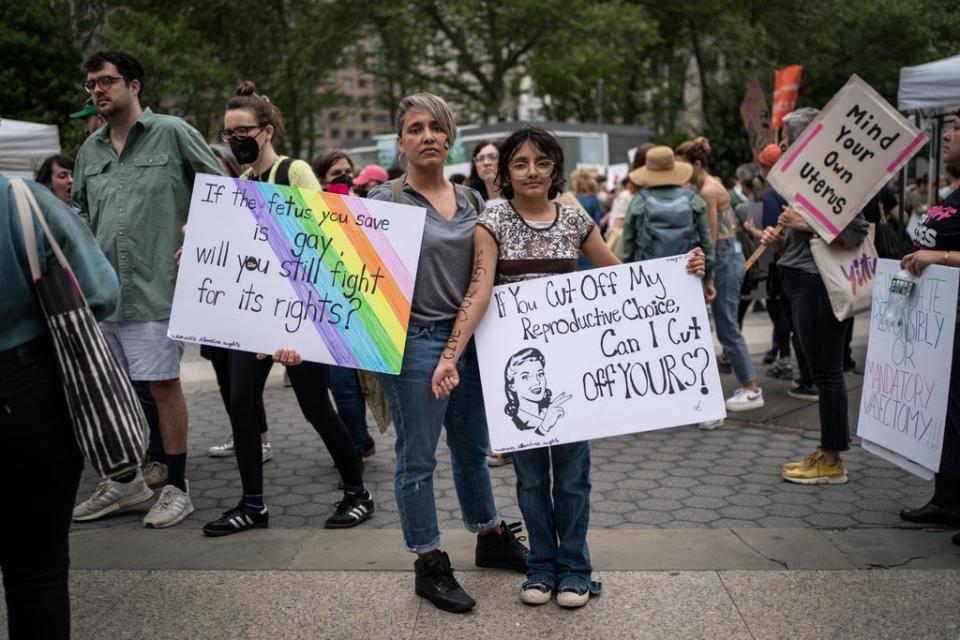Oklahoma passes US’s strictest abortion law with Roe v Wade decision still in balance
Oklahoma governor Kevin Stitt on Wednesday signed a law that bans abortions from the stage of fertilisation and allows private citizens to sue medical providers who “knowingly” perform or induce an abortion on a pregnant woman.
The law, which is being called one of the strictest pieces of anti-abortion legislation in the US, comes into effect immediately.
It provides exceptions only in cases where an abortion is necessary to save the life of the mother, or in cases of rape or incest if they have been reported to law enforcement.
This law was passed by the state’s legislature last week and is the latest from a GOP-controlled state to restrict abortion care. Previous laws passed this year include one banning abortion after six weeks, before most people know they are pregnant, and another making providing abortion care a felony punishable by up to 10 years in prison.
But the latest law also totally outlaws the procedure, directly challenging the right to an abortion upheld in Roe v Wade and subsequent cases for the last 50 years. It is modeled after a similar measure that took effect in Texas last fall, which uses citisens as enforcers to avoid legal challenges.
Abortion rights advocates in the state have raised an alarm, saying this ban would eliminate access to abortion across the South. A coalition of abortion providers and abortion rights activists have said that they will challenge the law in court and try to block it.
“We are seeing the beginning of a domino effect that will spread across the entire South and Midwest if Roe falls,” Nancy Northup, president and CEO of the Center for Reproductive Rights, said.
“Right now, patients in Oklahoma are being thrown into a state of chaos and fear. That chaos will only intensify as surrounding states cut off access as well. We will not stop fighting for the people of Oklahoma and for everyone across the country,” she added.

“Instead of working to make communities safer, Oklahoma politicians have made it their priority to outlaw abortion, even while Roe stands,” Alexis McGill Johnson, president and CEO of Planned Parenthood Federation of America said, according to CNN.
“For anyone seeking abortion in Oklahoma and beyond: Planned Parenthood and our partners are fighting for you. We will bring everything we have to make sure you can get the care you need, and challenge every ban enacted in Oklahoma.”
Trust Women, an abortion provider, said the bill is a “gratuitous and cruel flaunting of power by anti-abortion legislators”, The New York Times reported.
After signing the bill, Mr Stitt said: “From the moment life begins at conception is when we have a responsibility as human beings to do everything we can to protect that baby’s life and the life of the mother.”
Anti-choice Republican Governor Kevin Stitt just signed into law a total ban on abortion with a vigilante enforcement mechanism modeled after Texas’ draconian #SB8. This is the first *total* ban on abortion of its kind signed into law in the country.
— NARAL (@NARAL) May 26, 2022
“If other states want to pass different laws, that is their right, but in Oklahoma, we will always stand up for life.”
“I promised Oklahomans that as governor I would sign every piece of pro-life legislation that came across my desk and I am proud to keep that promise today,” the Republican added.
The sponsor of the bill in the Oklahoma House, Wendi Stearman, posted a photo of a newborn baby on her Twitter and wrote: “The success of this bill is a direct result of the people of Oklahoma letting their representatives know that the citizens of Oklahoma value life. Keep it up, Oklahoma!”
Abortion rights have taken a central stage in the US in the wake of a leaked draft opinion from the conservative-majority Supreme Court that signals the end of the landmark 1973 decision providing constitutional protections for abortion care.
The leaked draft opinion, which suggested striking down the federal right to abortion, has triggered protests and demonstrations across the country.
A wave of legislation in Republican-led states has proposed eliminating abortion access in most cases and criminalising abortion care. Currently, 13 US states have so-called “trigger” bans in place that would effectively and immediately ban abortion once Roe V Wade is reversed.

